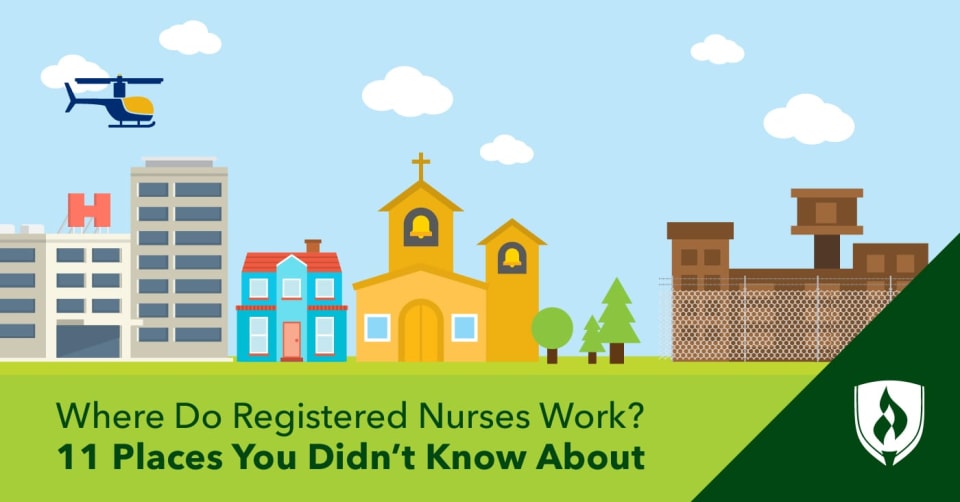
Where do registered nurses (RNs) work? The obvious answer is a clinic or a hospital. But the reality is that RNs work in a variety of different settings, specialties and environments—some of which may really surprise and intrigue you!
If you’re considering becoming an RN, there are several fascinating work environments from which to choose. That’s good news for those who are freaked out by hospitals or don’t like the clinic setting. So where do nurses work? It’s time to get educated.
We connected with one RN who’s held a range of positions in the industry to help give you a sneak peek into some of your options. Learn more about each setting to get a taste of what options might interest you. Curious what the different is in Clinic vs. Hospital Nursing? Read more in our article.
Get Your Nursing School Questions Answered at a Nursing Information Session
Where can nurses work? 11 lesser-known options
After perusing this list, you’ll understand that RNs have a wide range of possibilities—both when it comes to the work environment and the daily duties you will perform. The key is finding a good fit that aligns with your skills and interests.
1. Camps
Amidst the cabins, canoes and canteens, there are medical professionals helping to make sure summer camps are a safe place for kids. As a camp nurse you will perform a variety of duties, all while enjoying the very unique and serene camp setting.
Jennifer Schmid is an RN and natural wellness educator and recalls her experience as a camp nurse as being fun and rewarding. She loved working with children in such a picturesque environment. She says her wide range of duties included pulling out splinters, administering medications, wound care, liaising with parents and providing lots of hugs.
“Camp nursing is a great opportunity for new grad RNs who enjoy nature and want to improve their skills fast,” Schmid says.
2. Correctional facilities
As the number of detainees in America continues to rise, so does the need for medical care in our correctional facilities. Correctional facilities nurses care for detainees dealing with a wide range of medical problems, from diabetes to seizure disorders to HIV. It should be noted that working with incarcerated individuals will have its risks and requires an individual with thick skin and an interest in caring for potentially dangerous patients.
3. Schools
It’s probably not surprising that nurses work in educational facilities, but it is an often-overlooked option. Whether you’re at the elementary or college level, school nurses are needed to take vitals, give basic care and facilitate the need for urgent care from a physician.
Schmid recalls being assigned to work at a high school that had two students with Type 1 diabetes. On top of her normal duties, she was responsible for helping them measure their blood sugar before meals and administer insulin when necessary.
“I loved working with these students and their faculty,” Schmid says. “They were so appreciative of my help as well as what I taught them about nutrition and how certain foods affect blood sugar.” This is a great option for nurses who enjoy working with youth and appreciate regular hours and variety in their workday. Explore more in this article about everything you need to know about being a school nurse.
4. Patients’ homes
It may surprise you to learn that there are still a large number of medical professionals working out of patients’ homes. Whether it’s caring for elderly individuals or those with developmental disabilities, home health nurses may assist with basic living skills, handling bodily functions—and of course, administering medical care. This is a really rewarding option if you enjoy getting to know your patients on a very personal level.
5. Places of worship
Some churches, synagogues and other religious institutions employ faith community nurses. These nurses often follow the same practices as holistic nurses, taking into consideration the religious practices of their particular faith. As a faith community nurse, you may be asked to provide education on health topics, spiritual and physical wellness counsel, and holistic methods of care.
6. Emergency vehicles
Transport nurses provide emergency care for patients who are en route to a healthcare facility. This might include patients being transported via ambulance or those who are airlifted to receive critical care. These individuals typically treat life-threatening conditions, so it’s imperative for transport nurses to be able to think critically and remain calm under pressure.
7. Publication companies
While not a particularly common path, some experienced RNs looking for a change of pace may move on to become nursing writers, consultants or historians. These nurses may be involved in writing, editing and proofreading technical material for an educational textbook or a biomedical research project. They may even work as a script consultant for television shows or movies featuring nurses.
8. Missionary clinics
Missionary nurses work all over the world in clinics or hospitals that are often owned and operated by religious organizations. As a missionary nurse, you will get to share your faith while providing vital care and medical education to people of another culture.
9. Courts of law
Nurses working in courts of law are most likely forensic nurses, meaning they are trained in medical evidence collection and the criminal justice system. As a forensic nurse, your duties will likely include taking blood and tissue samples, collecting other vital bodily evidence, and providing support and comfort for victims.
10. War zones and military bases
Military nurses care for patients within our armed forces at bases and in war zones all across the globe. As a military nurse, you will have the unique opportunity to care for others while serving our country and experiencing other places and cultures. You’ll also be required to live up to the high standards of your military branch in addition to all the usual requirements of a medical professional.
11. Your own office!
Whether you branch off to become a private nurse educator, a holistic nursing consultant or a nursing blogger, you could find yourself working for yourself someday. If you have the entrepreneurial spirit, consider the work-from-home nursing jobs you could land by becoming an RN first.
“Having my own office space means I can be flexible and work when it is most convenient for my clients, my children and myself,” Schmid shares. She loves being a work-from-home holistic nurse because she’s able to foster one-on-one relationships with clients, helping her identify the most effective way to facilitate their healing—all on her own time!
Where do you envision yourself working as a nurse?
So where do nurses work? The answer is practically everywhere! Now you’re aware that RNs work in a variety of settings and perform a whole slew of special duties. This means pursuing a nursing degree isn’t a dead end. There are many different avenues you can follow throughout your career.
If you’re excited about the variety a nursing career offers, it’s time to take the next step. Start mapping out your journey by checking out our article How to Become a Registered Nurse: Your 4-Step Guide.
Related Articles:
- 9 Unique Types of Registered Nurses Who Make a Difference Every Shift
- ER vs. ICU Nursing: Which Healthcare Environment Suits You?
- Is Nursing a Good Career? Nurses Dish the Details
- What Is Community Health Nursing? Examining This Important Role
- 5 Nursing Mistakes to Avoid if You Don't Want to Be the 'Bad Nurse' in Your Unit
- How to Become an Aesthetic Nurse: A New Look at This Nursing Niche
EDITOR’S NOTE: This article was originally published in 2013. It has since been updated to include information relevant to 2019. Insight from Schmid remains from original article.




